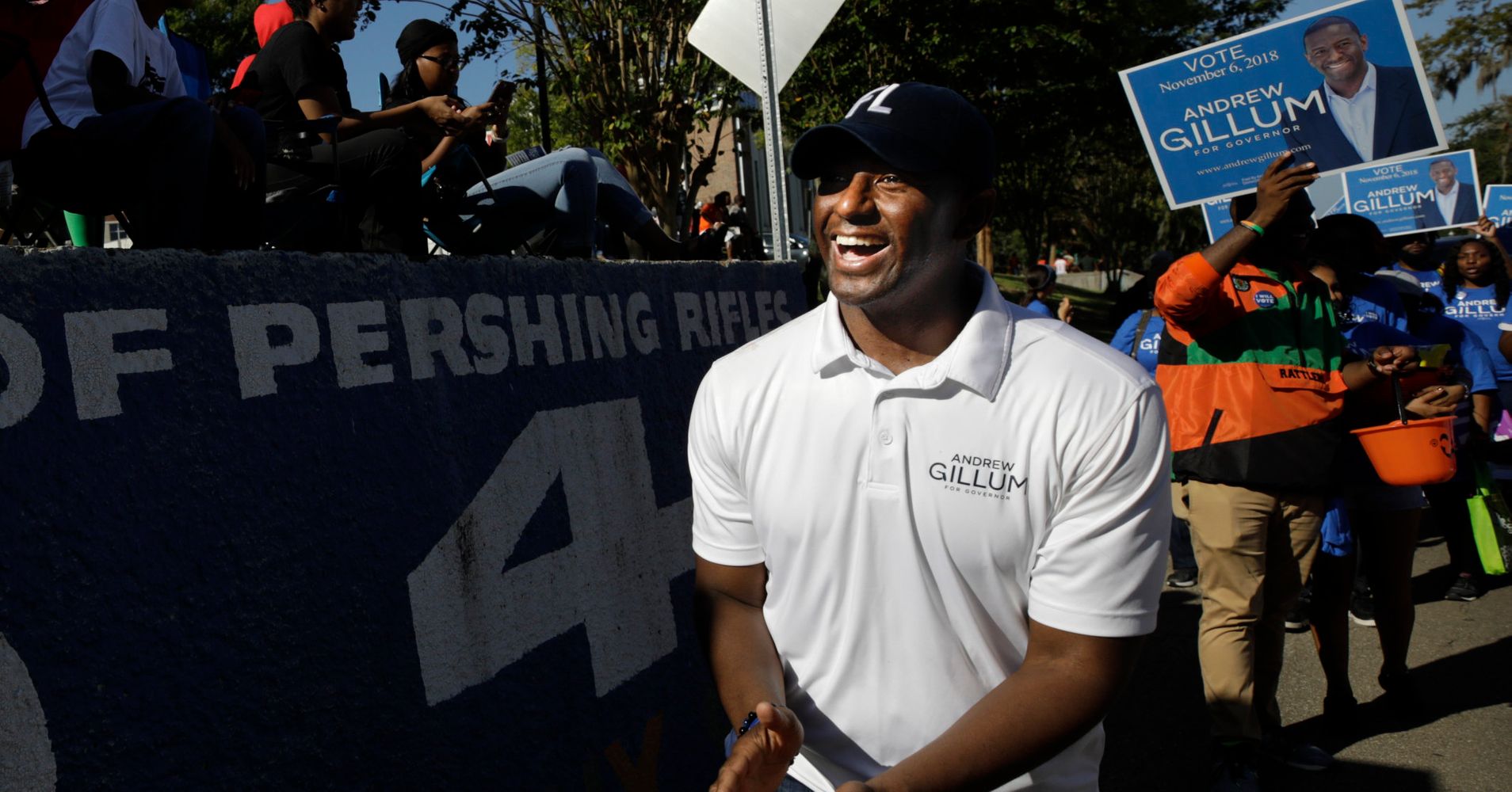[ad_1]
TALLAHASSEE, Fla. — It’s 8:15 a.m., and a group of 40 or so people await him. They’ve been standing around the front of Bethel AME Church in their “Andrew Gillum for governor” tees for about an hour. When they see Gillum striding toward them, they erupt into raucous applause. He immediately scoops up Jett Williams, a precocious 2-year-old sitting in a wagon and sporting a Florida A&M University football jersey, initiating the first of many photo ops that Saturday in early October.
Gillum, 39, has barely handed Jett back to the boy’s mother, Kay Harper Williams, before a group of people in “Black Voters Matter” shirts rush up to him with their arms extended and their camera apps open. He stretches out his arms and flashes a bright smile that quickly becomes a warm chuckle.
See, it’s homecoming, y’all. And Gillum is a fixture of FAMU’s homecoming parade. They love him here, not in the way that fans love a celebrity or adherents love their leader. It’s simpler than that — something like a mother doting on a long-lost son. Except that Gillum is at home here. He served on the Tallahassee City Commission from 2003 to 2014 before he was elected mayor, a position he has held since. He’s a Rattler, having graduated from the university in 2003. This is his element.
Around here, Gillum needs no introduction, and he don’t meet no strangers. These are his talents. He is at home everywhere, and everywhere he is loved like someone who finally came home.
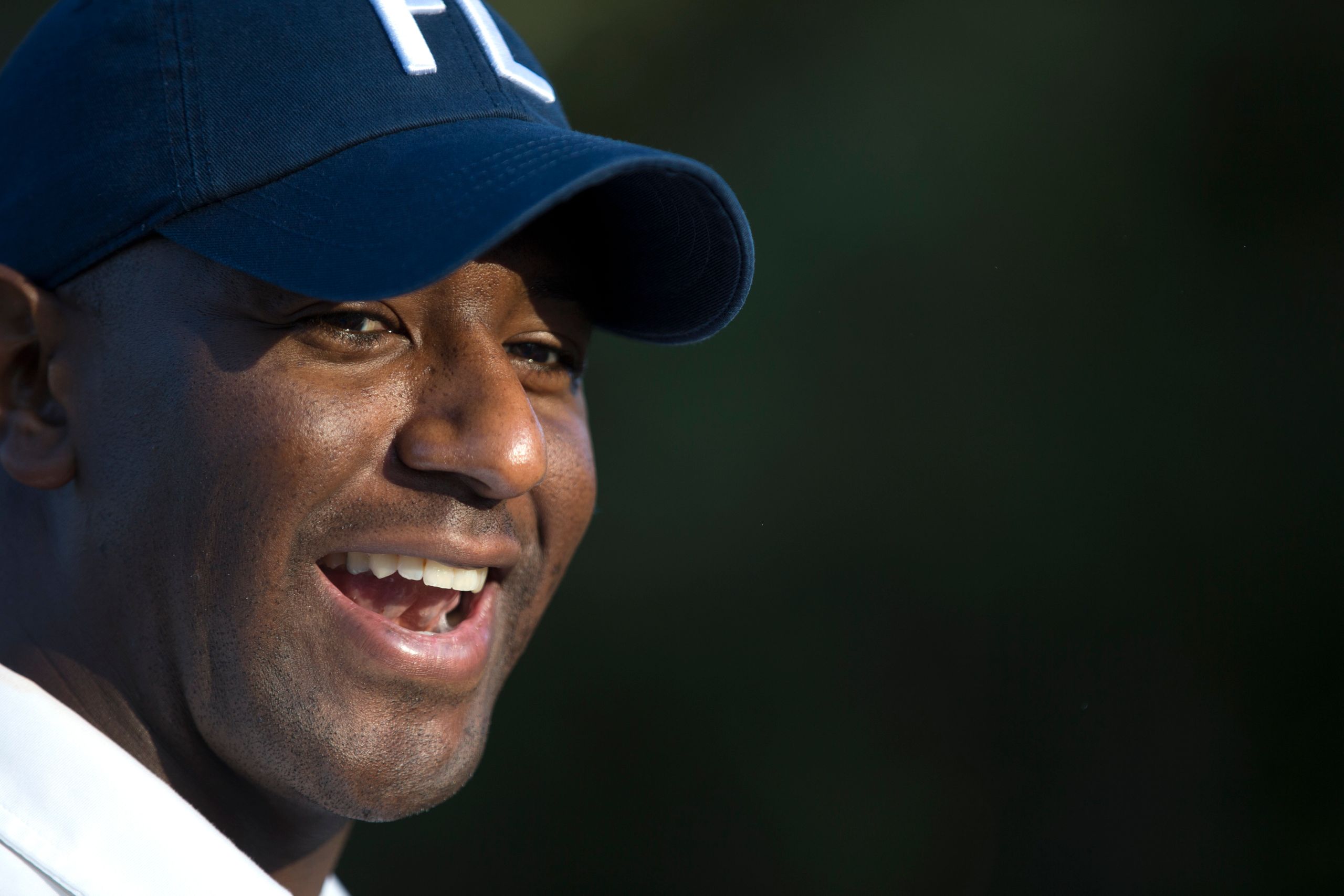
A few weeks ago, something miraculous happened in American politics. A black politician called a white politician a racist and got away with it. A black man called a white man a racist in public, on live television, and he did it so deftly, and he so discombobulated the other guy, that people forgot to accuse him of playing the race card.
To be sure, Gillum technically didn’t call his Republican opponent, former Rep. Ron DeSantis, a racist during their second debate. That was the political genius of the riff. Later, a campaign staffer told me Gillum cribbed the concluding line from a pastor with whom he spoke about two weeks before the debate. It was strategic, and Gillum was prepared to use it. How could he not? This was oppo from God.
Let me back up, though. The context is important. From the surprising moment in August when Gillum grabbed the Democratic nomination, making him the first black major-party gubernatorial candidate in Florida’s history, racism became the fulcrum of the election. This was certainly not Gillum’s desire when he launched his bid for governor; his people are at pains to say his campaign is not explicitly about race. Endorsed by Sen. Bernie Sanders (I-Vt.), Gillum is running on a straightforward populist platform: Medicare-for-all, hiking the minimum wage, boosting Florida’s corporate tax rate.
But then DeSantis told Florida voters not to “monkey this up” by electing Gillum. And then voters began receiving robocalls from a neo-Nazi group in Idaho. In the call, a man pretends to be Gillum and says in a stereotypically exaggerated dialect over drums and jungle noises, “We Negroes … done made mud huts while white folk waste a bunch of time making their home out of wood an’ stone.” The speaker also falsely claims that Gillum will pass a law allowing black people to escape arrest “if the Negro know fo’ sho he didn’t do nothin’.”
And then a GOP official from the Orlando area posted a meme falsely claiming that Gillum will issue reparations for African enslavement. And then, stumping for DeSantis on Oct. 6, Rep. Matt Gaetz (R-Fla.) accused Gillum of overseeing a rise in crime in Tallahassee, dubbing him “Andrew Kill ’Em.” (In September the Leon County sheriff said violent crime has dropped since Gillum has been in office.)
And then a second robocall went out from the same group, once again featuring a man pretending to be Gillum and speaking in an exaggerated dialect, this one with Negro spirituals interlaced with monkey screeches in the background as the narrator muses that using chicken feet as medicine is what would keep Gillum’s health plan cheap.
The election had become a local production of America’s ongoing psychodrama about race. During the candidates’ second debate on Oct. 24, the moderator began winding his way through a question regarding DeSantis’ “monkey this up” statement and why he made four appearances at events hosted by a white nationalist. But before the moderator could finish, DeSantis lashed out, declaring that he wouldn’t let the media smear him and he wouldn’t take anything from Gillum.
To this, Gillum dropped his head and chuckled, and then he put home what will go down as an iconic slam dunk. “Well, let me first say, my grandmother used to say, ‘A hit dog will holler.’ And it hollered through this room. Mr. DeSantis has spoken. First of all, he’s got neo-Nazis helping him out in the state. He has spoken at racist conferences. He’s accepted a contribution and would not return it from someone who referred to the former president of the United States as a Muslim n-i-g-g-e-r,” Gillum said, spelling out the slur once tweeted by Steven Alembik in reference to Barack Obama. “When asked to return that money, he said no. He’s using that money to now fund negative ads.”
And here came the coup de grace, the line the pastor handed him. “Now, I’m not calling Mr. DeSantis a racist,” Gillum said, shooting his eyebrows skyward and nodding. “I’m simply saying the racists believe he’s a racist.”
It was a perfect formulation, suggesting both a fluency and an impatience with how the political and media culture typically handles accusations of racism. Black candidates operate in a bind. They can’t call out racism because the minute they do, they’ll be accused of playing the race card, of responding emotionally to attacks based in the denial of their humanity. Had he gone directly after DeSantis and bluntly called him a racist, Gillum might have expected several weeks’ worth of tortured coverage: Is DeSantis truly a racist? There would be testimonials from his side, black friends of DeSantis’ deposited in front of cameras and microphones, counteraccusations that his opponent was making too much of race, and in turn, Gillum would be pressed to qualify his statement.
But Gillum avoided the trap. People responded to it as if it were a sports highlight. When I first saw it, I laughed and said “Oh, shit!” as if I had just watched Allen Iverson step over Tyronn Lue for the first time. Gillum was smooth up there too, rolling into the line instead of snapping it off in the hammy way that politicians often do.
“What happens too often happens to black people in a role such as his is that you find that you have to be twice as prepared, you have to toe the line more than anyone else but that you’re carrying your people on your shoulders,” said Cynthia Moore Chestnut, a former member of the Florida House of Representatives and now the chairwoman of the Alachua County Democratic Party. “So you can’t afford not to be prepared, not to seize the moment. You have to because you’re representing more than yourself.
“But you know, we have to walk on water. We have to walk on water.”
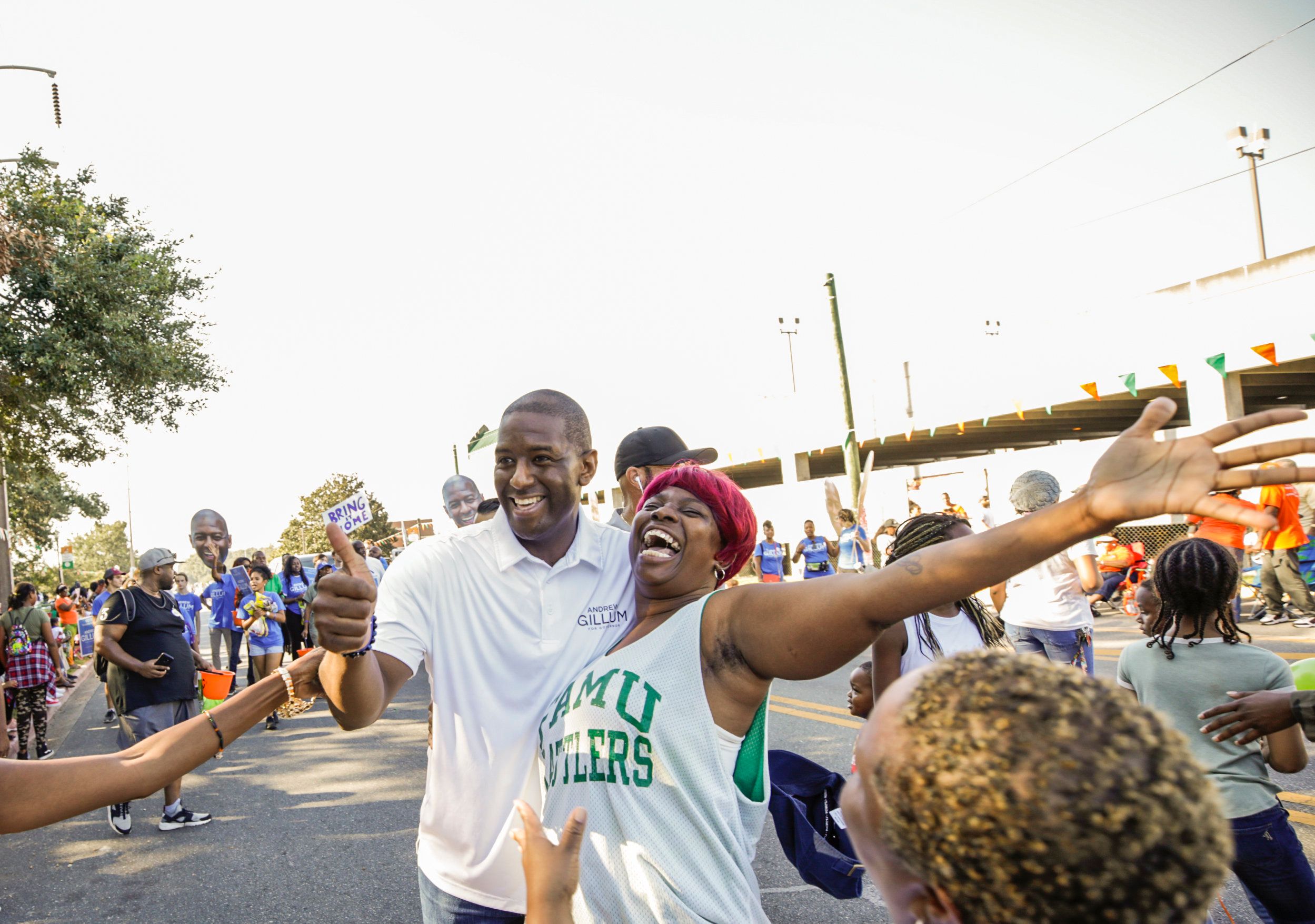
By 8:57 a.m. on the day of FAMU’s homecoming parade, Gillum has greeted at least a hundred people. He hasn’t broken a sweat. Every person gets the best version of Gillum that he has to offer. He stops to greet a woman sitting on the side of the road watching the parade. He holds her hand as she shouts out that she’s praying for him and his wife, R. Jai Gillum.
The scene charges up Andrew Gillum’s entourage. They start chanting their campaign slogan, “Bring it home, Andrew! Bring it home!” He stops again to photograph one of his campaign staffers and another member of the black sorority Alpha Kappa Alpha, the latter woman wearing a “Pretty girls for Gillum” shirt. He pushes the importance of voting while conversing with a woman on her Instagram live. He frequently leaves his designated spot behind the car guiding his path through the parade to interact with onlookers — a maneuver that causes one member of his entourage to gently guide him back to his spot. Defiantly, Gillum jogs to the other side of the road to do it all over again.
When he’s not going to the people, they’re running to him. They have their cameras in their hand, ready to take photos and shake hands with the man they believe will be the next governor of Florida. While this may seem exhausting to some, Gillum meets everyone with open arms and says he doesn’t mind the onslaught of attention.
“It was energizing, and I’m honored that somebody wants to take a picture,” he says. “It’s not work for me.”
This love for people was a gift from his father, Charles Gillum. He worked in construction, and when things were slow, he and a young Andrew would sell fruit on a corner, back when no one cared to take Andrew’s photo. On the street, watching his father look his customers in the eye, Andrew learned an early lesson in what you might call retail politics.
“He’d loop people in personally. ‘What’s going on? How’s such and such?’ That kind of thing. And then they’d leave buying stuff they didn’t think they needed because my dad had hooked them in,” Andrew Gillum says with a laugh. “But he loves people, and that love for people passes on. It’s not new to me.”
From his mama, Frances Gillum, and her people, he got the habits of selflessness you tend to find in church mothers in un-air-conditioned Southern Baptist chapels after service. She is from Clyattville, a small town right outside Valdosta, Georgia, and tucked deep into the state’s farm belt, where Southern hospitality is law. “I remember my grandmother, if she had nothing in the refrigerator … [and] people came over, somehow she was making something. And it was always good,” he says. “She’d make something out of nothing. But that’s what you do for folks when they come by to see you. When they take interest in you, you do what you can to accommodate.”
Chestnut remembers Andrew Gillum as a teenager living in Gainesville, Florida. He was best friends with her son, Chris. After school, Gillum and other students would head over to Chestnut’s house to chill. While the others were out front eating pizza, Gillum would be in the kitchen, helping her prepare food or talking.
“He was always the helper. My son said that they called him ‘the principal’ because he was the one in class always prepared, ready with the agenda, with whatever needed to happen. He believes in being prepared,” she says. (If there was a hint of an insult in the nickname other kids assigned to him, it hasn’t lived on in the anecdote’s telling.) “It said a lot to me about the kind of person he was — and he is.”
His politics flow out of his personality. Every facet of his platform, Gillum says, is rooted in his life. When he talks about health care, he recalls those all-day waits at the free dental clinic to have his teeth cleaned as a child. He remembers believing that’s the way things worked — you went, and you waited your turn. He stumps for increasing teacher pay because of educators who saw something in him worth saving.
Gillum fights for LGBTQ equality because he has a gay sibling who packed up and left for California, he says, “just so that he could be himself.” Cliff Thaell, a former Leon County commissioner-at-large, recalls Gillum speaking to a crowd at First Presbyterian Church in Tallahassee after the Pulse shooting in Orlando in 2016.
“He was able to take all that pain and express that we were going to stand up to that kind of terrorism, that kind of bullying, to the NRA, but he put it in a personal context,” says Thaell. “He was able to take that incident and put it in the most personal of terms and share it with a large crowd of people and help us feel his pain — and his leadership, his vision.”
Likewise, Gillum’s approach to criminal justice reform — including bail reform, restoration of voting rights and “ban the box” measures, which would prohibit asking on job applications whether applicants have a criminal record — was informed by his siblings’ experience. Three of his brothers have had run-ins with the law. His older brother Patrick Gillum was accused of burglary and assault in 1991. A few months later, he was sentenced to a year in jail for cocaine possession. That year, 17-year-old Chuck Gillum was charged with armed robbery and sentenced as an adult. Patrick Gillum took plea deals because he couldn’t afford to post bail, and both brothers had a hard time finding work after their release. In 1999, Chuck Gillum was sentenced to 15 years in prison for trafficking just under a pound of cocaine. In 2006, Eric Gillum was sentenced to four years for burglary.
“That’s not somebody’s talking point,” says Andrew Gillum of his criminal justice platform. “That’s what I believe. And it’s shaped by the fact that I’ve seen how this thing plays out and how it works.”
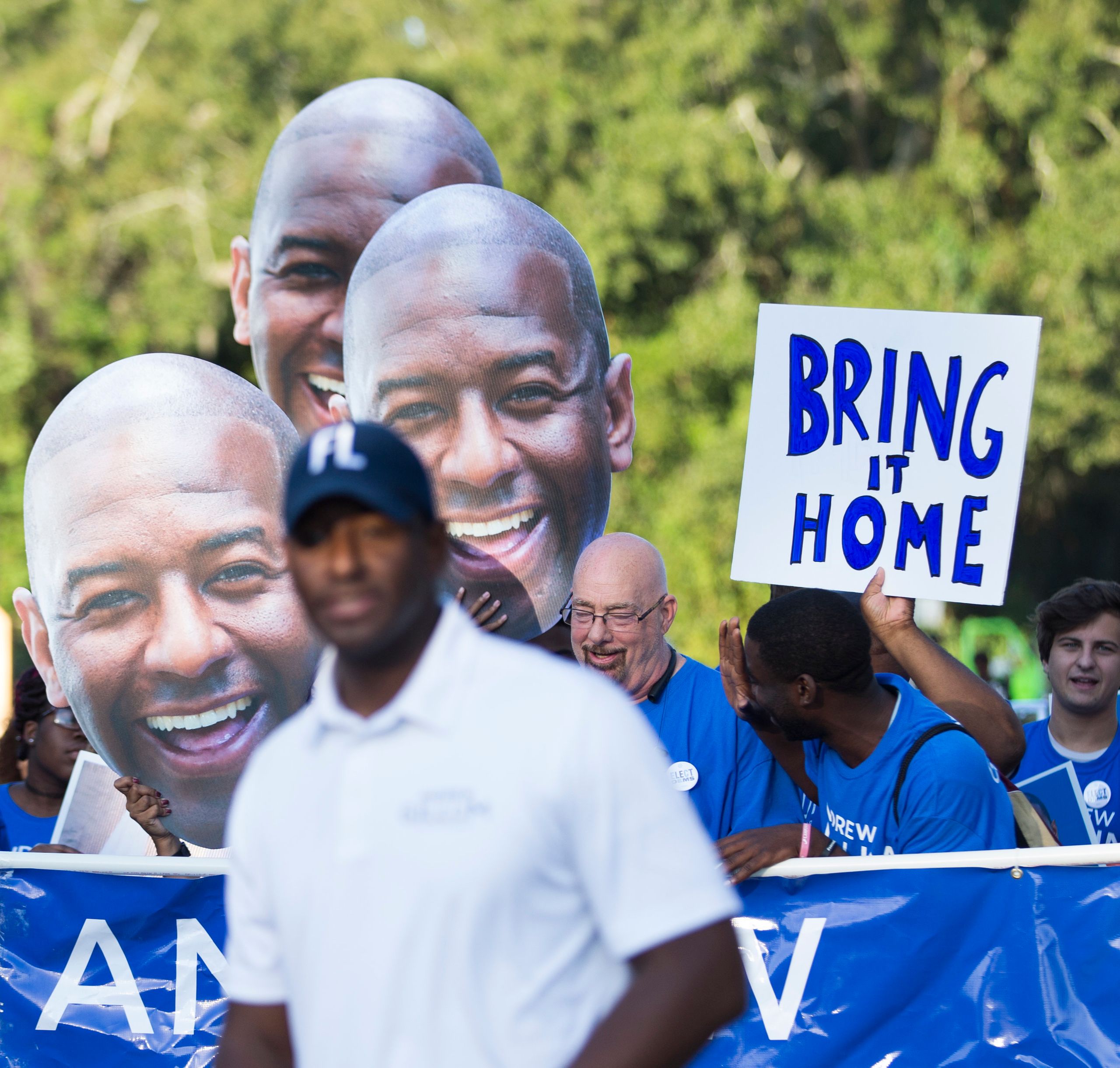
Ella Baker Jackson, Gillum’s maternal grandmother, was the only child in her family to attend grade school. She, like many black kids who were fortunate enough to attend school in the early days of Jim Crow, was instructed to bring home what she had learned in class so she could educate the rest of the family. She instilled the same notion in Gillum.
“I can still hear my grandmother’s voice,” he says in a campaign ad from September. “She said, ‘Go to school, mind your teachers, get your lesson. And one day, bring your education home.’”
“Bring it home” is now his campaign slogan. Too little has been said of the role memaws play in shaping the politics of black folk. I’m serious. Grandmothers are a kind of government unto themselves in the black community, at once a legislature, an executive and a judiciary. It’s one-party rule, tough but fair, a whole benevolent system of social control running on anecdote and aphorism (“A hit dog gon’ always holler,” my Muss would always say.)
Black grandmothers might be affectionate and nurturing, but there’s nothing soft about their job, which is to raise their grandkids to be impenetrable. They ensure that you know how to handle all the racist ills that will inevitably be thrown your way. They’ve been where you’re trying to go ― so they hip you to how folks will try to discredit your intellect and your experiences. They reaffirm your blackness. They guide you through what it means to be black in this country. They teach you what it means to demand respect as a black person and that no bit of disrespect is too small to raise hell over.
They lay a foundation in their grandkids for a moral self, which is what becomes a political self.
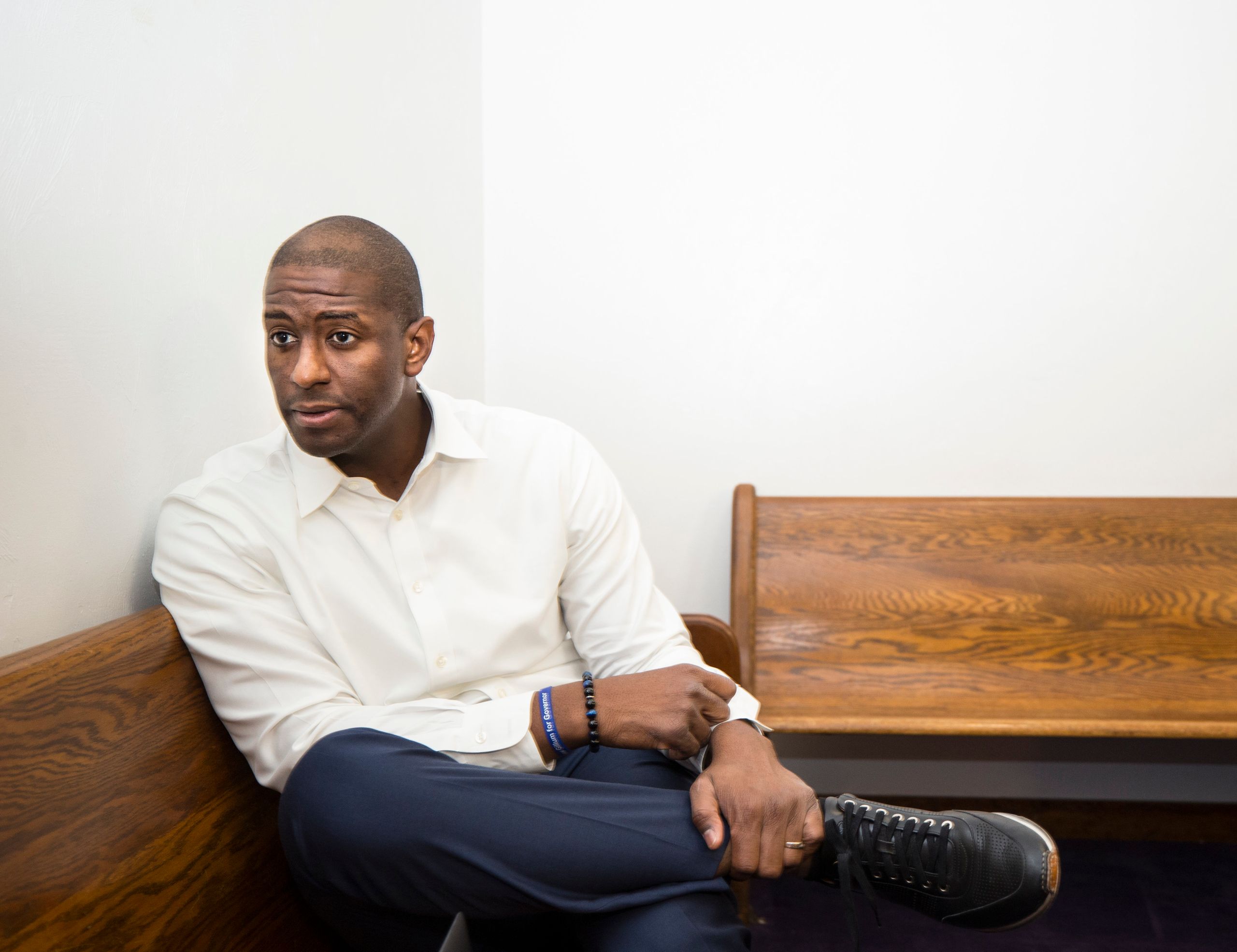
During my day following him around Tallahassee, I realized something about Gillum. He is black black. He is openly and proudly black in a way rarely seen in politics, which tend to prefer a blackness that’s been modulated by white institutions. He grew up poor in South Miami-Dade County. He has multiple family members who have cycled through the criminal justice system. He attended a historically black university. He’s black in the big things and the small ones. At a Congressional Black Caucus Week forum in September, I noticed him pointing at his interlocutor and popping his hand back — black semaphore for “I heard what you said, and I agree.” He frequently employs African-American vernacular in a natural way. It’s not an empty attempt to connect with black voters who aren’t black like he is. It’s just how he talks. And while blackness is by no means a monolith, Gillum represents a kind of blackness that is commonplace in black life and basically nonexistent in high-level American politics.
His campaign is an exercise in recasting populism in a black idiom. In political terms, this manifests as a friendly pragmatism. “We’re running a campaign that is historic in nature but that is practical in its goals,” says one campaign staffer. “The things that he wants to do are going to help a whole lot of white people. He said that in church … and everyone laughed. But it’s true, and everyone knows it, and we don’t want to lose sight of that.”
Gillum’s political message has remained the same in predominantly white, conservative Baker County as in Democratic stronghold Miami-Dade.
“I don’t think people are looking for perfect. They’re looking for real,” says Gillum. “Donald Trump ain’t perfect. In fact, he’s far from it. He’s, I think, unqualified for the office. But he tapped into something that was real for people, and they rewarded him with their support.”
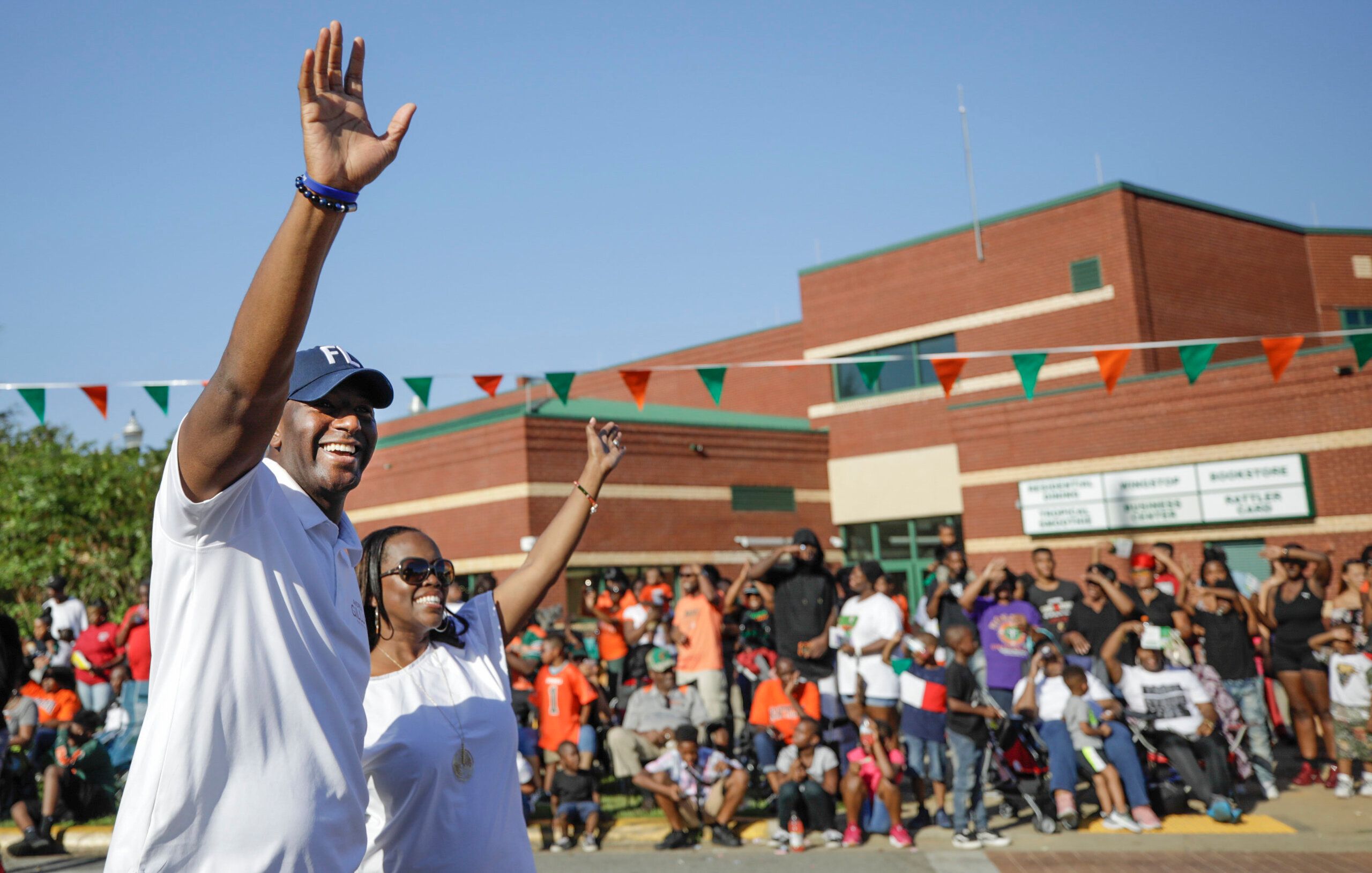
It’s 9:30 a.m. now, and the procession is nearing Bragg Stadium. The crowd up this way is thicker, louder.
When Gillum and company round the corner, onlookers let out a roar similar to what you hear when the Rattlers score a touchdown. A little boy who has spotted Gillum shouts, “It’s Andrew Gillum!” before darting out to meet the mayor. A few steps down the road, a little girl alerts her mother to Gillum’s arrival: “There he go, Mama! There he go!”
That’s what I hear the most in the crowd: variations of “There he go!”
“There he go, right here!”
“That just makes us all so proud here,” says Castillo Mitchell, a 22-year-old senior at FAMU and the owner of Flex My Complexion. “And just the motivation that it gives us as students … letting you know that when you come to FAMU, you could go anywhere.”
Says Kay Harper Williams, the mother of 2-year-old Jett, “Hope seems cliché, but I think it definitely puts in perspective what it is that my son can accomplish.”
Polls show that Gillum is locked in a tight race. During the Democratic primary, his campaign drew from his grandmother’s lesson: Even when he didn’t see anything useful lying around, he found a way to make something out of nothing. He beat out more-established and better-funded white candidates to drive the highest turnout in the state’s four most populous counties — Duval, Orange, Broward and Miami-Dade. These counties also have the highest percentage of black voters. Gillum spent a mere $4 million, compared with the $90 million spent by his opponents. He raised only $6 million. The game plan was pure retail politics.
“The most dehumanizing part of my day was call time,” he says, shifting his eyes downward for the first time during our conversation, “because I knew we weren’t going to raise any money. And I was going to be rejected God knows how many times in that one day. And I just told the team, ‘Look, this is not getting us anything. Not to mention, it’s beating me down a little bit. I need to get out and talk to people.’
“I kept believing that if we can get to people, if we can get to voters, if we can get into that auditorium or that living room or that space, I could introduce myself, and we will make it work. And so that’s what it became about.”
There is a lot of, let’s say, audacity in his confidence. He is certain he can walk into a room and tap into the depths of what people need from their elected officials. It is breathtaking.
“When it was determined that this was what we were going to do, then we were going to do it. And, like I said, this was nothing but my faith,” he says.
“That being said, we’ve got to be ready, and we got to work, and we can’t take anything for granted,” he continues. “And the beauty of this all is that we decided — my wife and I both — when we were going to do this, that we were going to run this race our way and we’d run it by being us. There’s no sense in running for an office as big as this trying to perpetrate somebody that you’re not. My grandmother was like, ‘Look, son, if you tell the truth, you don’t have to worry about telling enough lies. You just tell the truth.’”
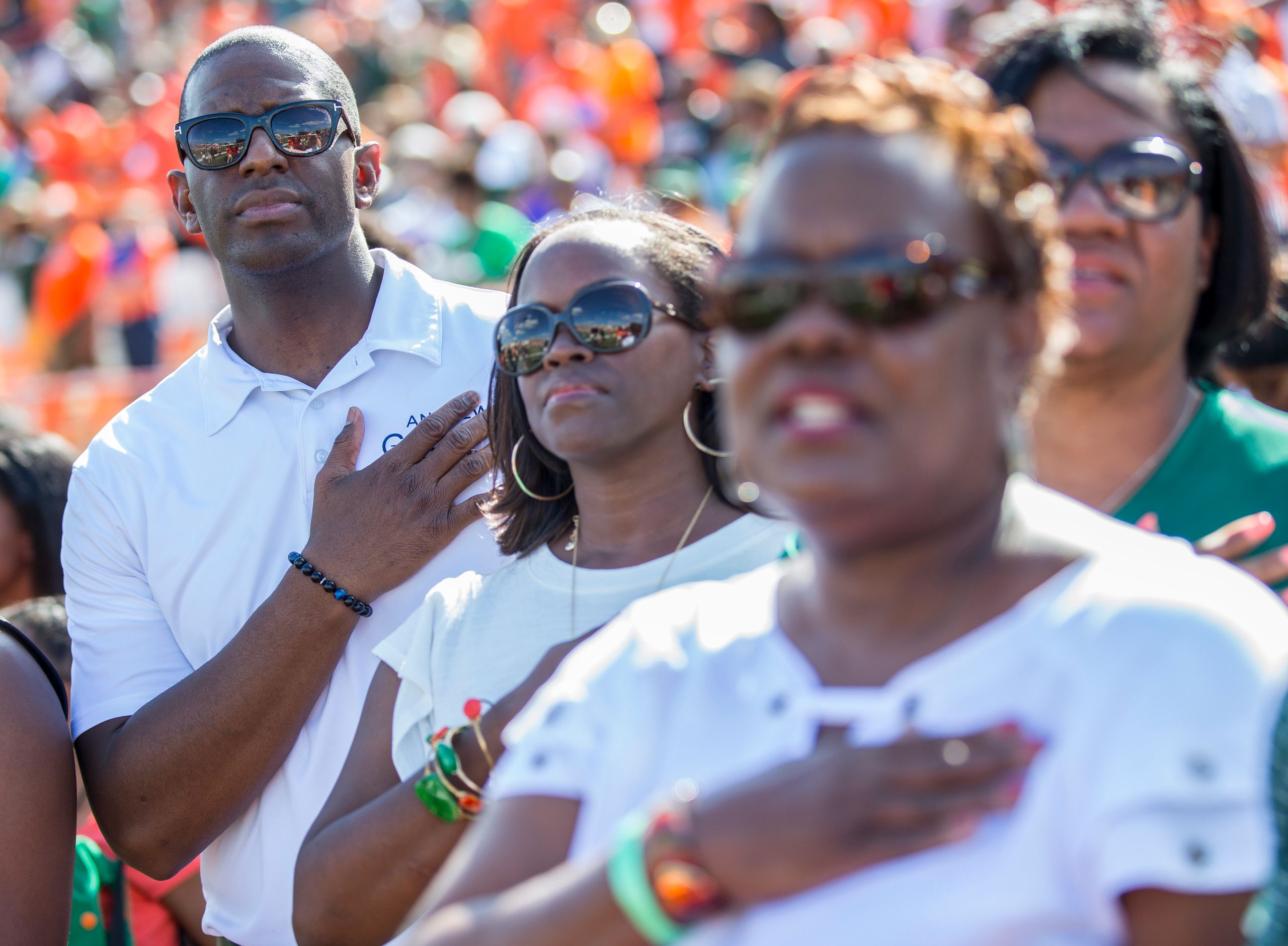
In 2015 three men with grandiose plans to redevelop Tallahassee parachuted into the city. Mike Miller, Mike Sweets and Brian Butler began scheduling meetings and attending gatherings with the best-connected people in City Hall, spending months getting tight with city officials.
But the businessmen were actually undercover FBI agents investigating whether developers were influencing city projects. One lobbyist of particular interest was Adam Corey, a former close friend of Gillum’s. (Gillum has since cut ties with Corey.) In 2016, Corey introduced Miller to Gillum. One meeting of the three men, which took place at a restaurant Corey had developed with taxpayer funds, made headlines because it was scheduled while Corey and Gillum were on vacation with other city lobbyists in Costa Rica. Gillum has said that he didn’t talk about business while he was there and that he paid for his portion of the trip. Corey’s attorney has said otherwise.
A separate investigation by the Florida Commission on Ethics centers on a 2016 trip Andrew Gillum took to New York with his brother Marcus Gillum, Corey and Miller. Emails show that Corey informed Andrew Gillum that Miller had arranged lodging, a trip to a Mets game and a boat ride to the Statue of Liberty. Gillum didn’t attend the Mets game and instead went to a performance of “Hamilton.” He says he paid for his trip, but recent texts released from Corey’s attorney indicate that Miller might have covered the tickets. (Although in the grand scheme of politics, “Hamilton” tickets are low ball.)
The FBI probe has resulted in a number of subpoenas name-dropping numerous city officials and insiders. Gillum is not among them.
Despite the lack of charges and despite Gillum’s protestations that FBI agents have assured him he is not the subject of their investigation, the case has lingered. One reason is that corruption has racial valences dating at least as far back as Reconstruction, when the figure of the crooked black politician became a powerful stereotype.
DeSantis and his supporters stop just short of making subtext the text. An October TV ad from the Republican Party of Florida pieces together misleading sound bites from news reporters to back the narrator’s false claim that Gillum is involved in an active criminal investigation and is “running from the FBI.” Just the other day, President Donald Trump, an avid DeSantis supporter, accused Gillum of being a “thief.”
Between the corruption talk — from politicians who are not exactly goo-goos — and the more straightforward racist political attacks, it’s not hard to see what Gillum’s opponents are driving at. “We know that the threatening black man … [has] persisted in our culture for hundreds of years, and they’re employing that,” one campaign staffer tells HuffPost. “There’s a genetic memory in the population that’s susceptible to these sort of images, these sorts of tones.”
Chestnut points to Gillum’s direct interactions with DeSantis during the state’s two gubernatorial debates, during which DeSantis continually referred to Gillum — a sitting mayor of the capital — as “Andrew.” Gillum, however, referred to DeSantis as “congressman” or “Mr. DeSantis.”
“The subliminal message to people watching that debate was ‘I’m going to put you in your place, boy,’” she says. “’I’m going to put you in your place, and I’m not going to give you your due respect. You can call me mister, ’cause that’s what you’re supposed to do — and I’m going to call you Andrew.’
“It was just so disrespectful, but to see it happen twice, in each debate? DeSantis did the same thing. It was very disrespectful. That was just very disconcerting … to see someone as young as DeSantis to carry that subliminal message of ‘I’m going to put you in your place.’”
None of it shook Gillum, though. In the midst of the attacks, he fell back on his faith. He maintains that God didn’t bring him this far to walk off and leave him. “At no point did I ever think there wasn’t a way to win,” he says. “At no point. If I had, I would not have finished. There was no point in the race that I did not think we could win.
“This got laid on my heart. I didn’t seek it,” he continues. “So all I had to do was be disciplined to it. Even now, we’re running around the state like we’re 10 points behind, because that’s what you have to do. That hustle is required. But I have to tell you, I think the story is already written on this. I think the outcome is already determined. I’m walking in it.”
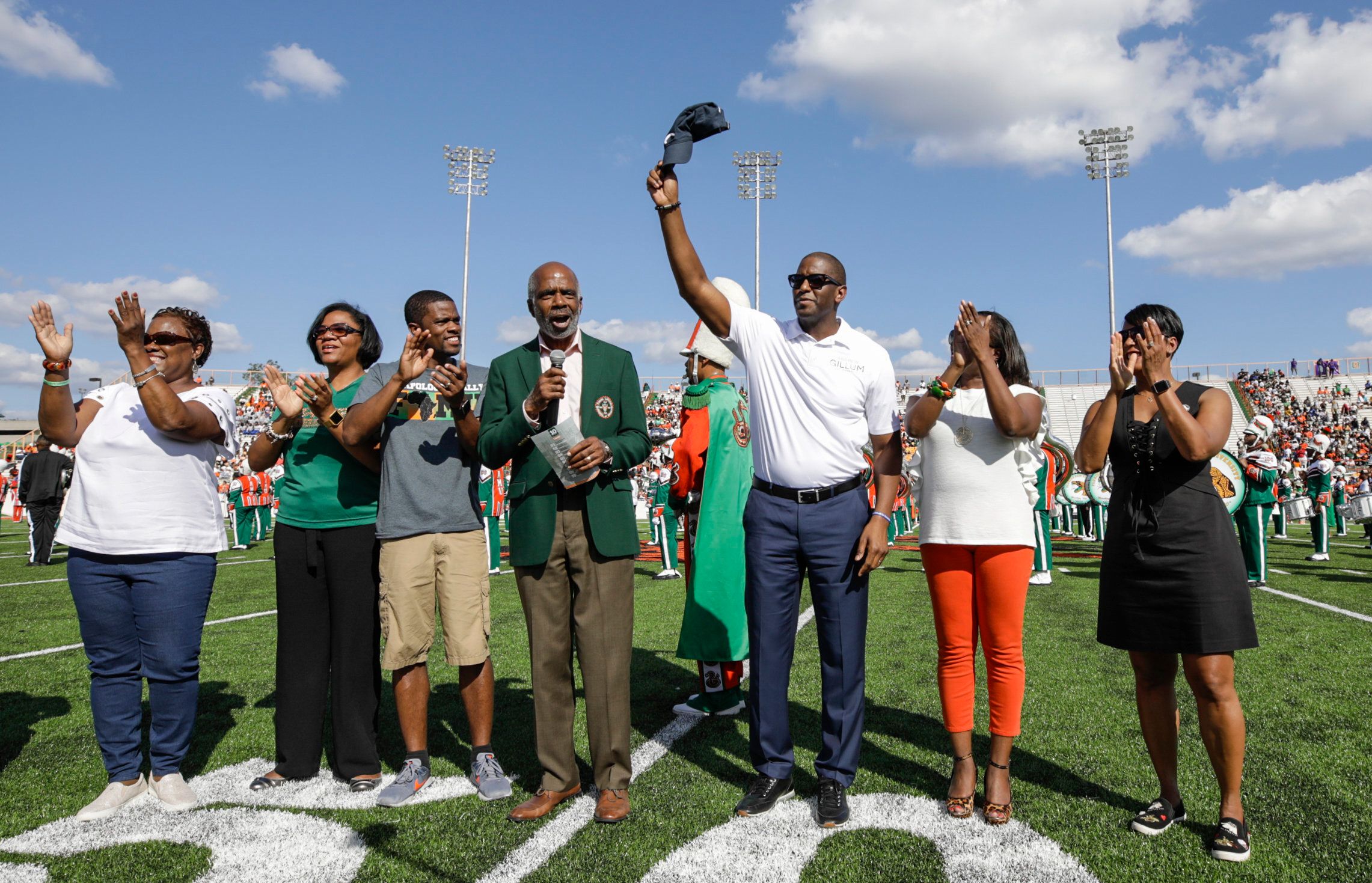
By 10:30 a.m., Gillum is nearing the end of the parade. A smudge of brown foundation sits on his shoulder, a residue of all the hugs he has given in the past two hours. He’s still charged up. He’s still greeting people who flock toward him. His arms are still open, and his smile remains as wide as it was at 8:15.
As he passes, a woman in the crowd shouts, “He’s making history!”
Mitchell, Harper Williams, Lamb, Chestnut and Thaell all believe that Gillum understands the magnitude of this election. When he won the nomination, he became the first black person to win a major party nomination in the state. Not to mention that seeing another black man doing something like this is affirming in a society that doesn’t allow most black people the space to be anything greater than the racist popular imagination.
Later I ask Gillum about the historic nature of this election. I tell him what black folks around the state have said to me about what his campaign means to them, about what it means to their children and grandchildren. His eyes widen, and a soft “wow” escapes his lips, and he seems to retreat inward. The natural extrovert who always has something to contribute looks stumped by what he should say next.
“I try to keep it in its proper place. Not to let, you know, history overtake the present,” he says, perking back up a bit. “But not for a moment do I not have, in the backdrop, what this means — not just for that woman’s children but for my own children and for the kids I mentored over the years — to be able to see someone that is accessible and that reflects their lives in the way that I think I do. Because there’s nothing that disrupts somebody’s negative opinion of themselves or what people limit them to better than seeing it done.”
“He needs no introduction!” shouts an announcer at the parade. “The FAMU graduate, the mayor of the city of Tallahassee … Andrew Gillum! Let’s hear it for Gov. Andrew Gillum!”
Gillum throws his hand up to wave at the crowd surrounding him. Cheers and applause pierce the air, drowning out the ambient noise of the marching bands, and wrap around him like a mother’s warm embrace.
“Bring it home, Andrew!” chants the crowd. “Bring it home.”
CORRECTION: A previous version of this story misstated the name of the person who tweeted a slur about Barack Obama. It was Steven Alembik.
REAL LIFE. REAL NEWS. REAL VOICES.
Help us tell more of the stories that matter from voices that too often remain unheard.
[ad_2]
Source link

